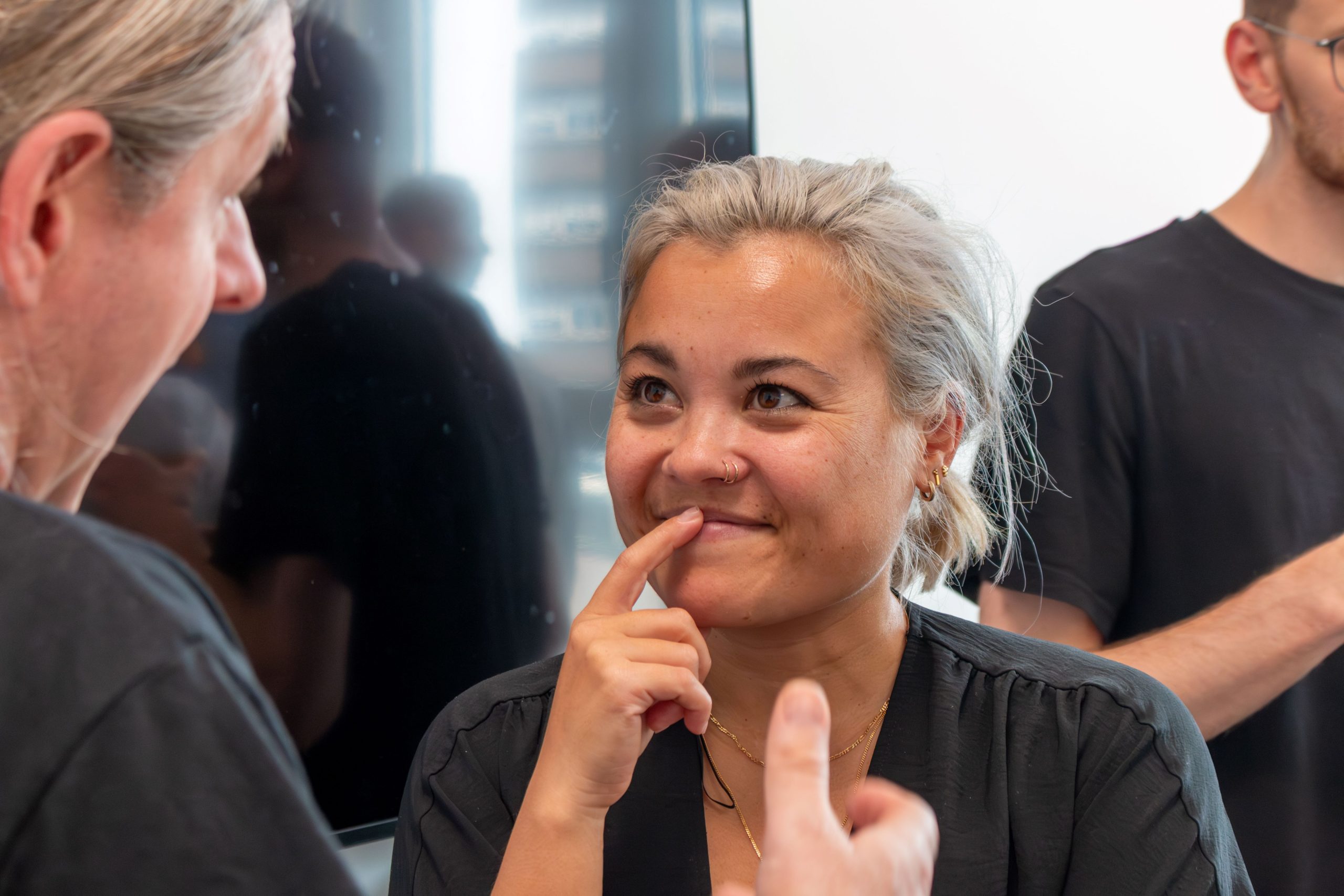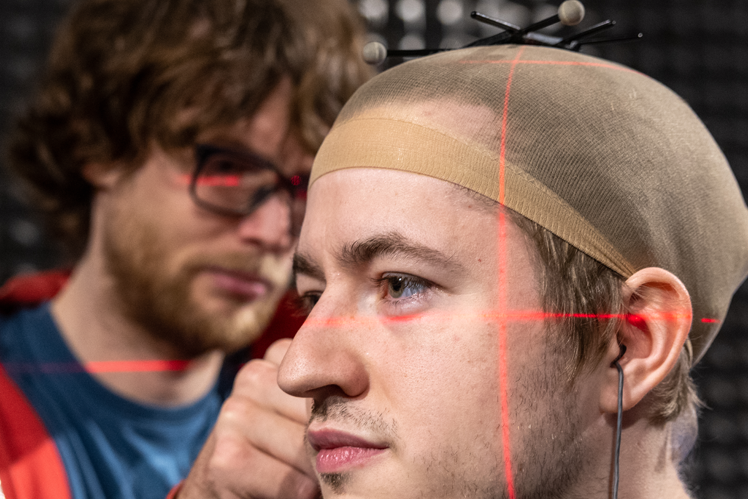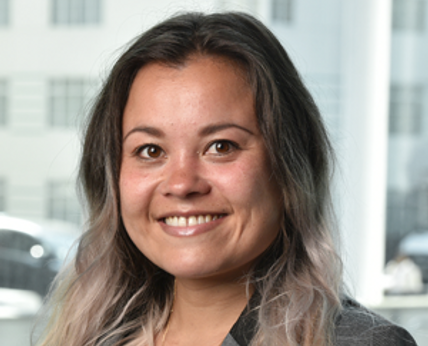Celebrating International Project Management Day: Siobhan Markus
Meet Siobhan Markus. Siobhan is the Project Manager for the SONICOM project. She is currently the Head of Impact Management within the Research Impact Management Office at Imperial College London. She has lived in the UK for several years since moving from her home in Sydney, Australia, where she studied a Bachelor of Media and Communications at the University of Wollongong.

Get in touch with Siobhan via LinkedIn.
A few words on Siobhan from SONICOM PI, Prof Lorenzo Picinali:
“Siobhan is not just keeping track of deadlines — she’s the person who quietly makes sure that every deliverable, every communication, every small detail actually happens. And that is not actually particularly incredible…I, too am a precise person, and deliver timely work. What is amazing is that while I do it by being a terrible pain for whoever works with me, she does while being a lovely person, always cheerful and full of positive energy. I still need to understand how she does it…”
Siobhan’s work and career
- What are you working on in SONICOM: in the past, now, or soon?
I am SONICOM’s project manager. Broadly, I support the consortium in the overall management of the project but my day-to-day can range from being the liaison between the funder (European Commission) and the consortium, monitoring the finances, coordinating meetings, and shaping and implementing processes for reporting submissions.
Alongside this is managing another EU-funded project (DIAMONDS), managing a small team of communicators and (after a few caffeinated breaks), leading on the impact strategy of our office.
- What is your scientific background?
That’s the ticket. I don’t have one. I came into managing research from a roundabout way. Somewhere from being a hip hop dance teacher whilst doing my Bachelors in communications, to the world of publishing, I ended up gravitating back to the world of academia simply because I loved being around it. I started managing internship programs (in Sydney, Australia, my home) and designing leadership programmes. I moved to the UK in 2018 and happened upon (another way of saying I applied and got the job, but it doesn’t have the same narrative flare) the Research Impact Management Office, where I went back to my roots. I was telling stories, making events, and covering the general communications for research projects. I had gone full circle and firmly planted my creative roots within the research and higher education sectors.
So, while I don’t have a scientific background, I have used my non-scientific background to connect scientists and their science with the world and each other. I have found great joy in this. That’s the ticket.
- What are the hardest parts related to your work?
By far, relationship management. This has so many moving parts, variables, and stages of growth that it can go from being tumultuous and rocky to sublime and serene within a day (or a second). As many adages lend to, relationship management comes with age, time, care and effort…and (the similes are now coming), like fine wine or a really stubborn house plant. Let’s stop there.
- What (or who) motivated you in difficult times?
Being stuck in a rut has happened so many times in my career. A few different things over the years have worked to rekindle joy or helped me get over the rut, but I would say the most effective one for me has been to step away. To go do something else, something completely different and random for a little bit.
Too often, I can get in the zone, which leads to a grind, which then mutates to procrastination and then before I know it, I am staring at a blinking cursor. I’ve found it hard to realise when I am in these moments, but when I do, I remember to trust that walking away is ok. And don’t force coming back to it either. It’s not about being serendipitous but rather just letting your brain flex elsewhere, breathe a bit, and getting some variety in stimuli.
- In ten years, what do you hope to have accomplished in terms of your work?
Oh gosh, hmmm this is something I never have really been able to answer because I suppose ultimately, I never found myself to have a particular career aspiration of ‘I want to be this…’ or ‘I want to do this..’. But I have had the privilege of having 3 older siblings (an onerous burden at times) who I have always considered as role models. Their life journeys seemed to have engendered contentment and independence in them, so surely, they must have been onto something, so why not follow in their footsteps. They were committed to pursuing further education and academic pursuits, and so I followed. They travelled around the world with their saved-up money, and so did I. They didn’t ascribe to one trajectory; rather, they explored passions and curiosities. And so I continue to do so. So I would say that what I hope to accomplish in terms of my work is somewhat abstract and immaterial: continue to learn, be curious, be challenged, be an integral part of a positive professional community, and find contentment and independence.
It’s not everyone’s cup of tea, but I have always been a coffee person anyway.
- What kind of prejudices, if any, did you have to face? How did that make you feel? Were you able to overcome these?
I think I grew up in and was absorbed by the stereotype that women do not commit to scientific pursuits. As I went higher in my education, I noticed the dwindling of women in my courses, and I eventually did the dwindling as well over to the more stereotypical areas for women, media and communications, for example. At the time, I remember being annoyed as I really liked science, but I didn’t find there were many discourses around that were actively convincing my sub- and subconscious thinking that this is something to continue doing. I did actively see this environment for my brother. Then ten years down the line, after graduating with a BA in communications but watching Cosmos on loop, I stopped and realised, what just happened? I don’t regret my education pathway, but I do stop and wonder if things would have been different if gender roles were changed.
- In your opinion, which changes, if any, are needed in the scientific system to engage more women in science and create more future female scientists?
REP-RES-ENT-ATION! Like I said before about not being around discourses that could have influenced me continuing my science education, if there is nothing setting an example of what is possible, it is harder to see what is indeed possible. We are a societal species and learn by doing, and lead by example, so representation – locally, internationally, in family units, in communities, in media etc., is so important.
- What do you think makes an effective “behind-the-scenes” leader in a research project?
Building respectful and affirming working relationships by way of an entrenched positive research culture ethos is the most important behind the curtain attribute of any research project. Sadly, I have seen some great opportunities being missed because a conversation did not happen or an idea was waylaid because of a lack of compromise. A positive research culture imbues research impact.
It is important that my day-to-day, and one that RIMO as a team strives for, is about building strong and constructive relationships with not just the researcher, but the person within the researcher. Numerous times, for example, I have been thanked gratuitously by academics for what is evidently a simple task of creating meetings. I understand, however, that for them it can sometimes mean more, i.e., a space for continued conversations and understanding. We are in the business of being the gooshy gel for the consortium, and while it is not tangible or visible, it is the most important behind-the-scenes work we do.
- What do you find most rewarding about your role?
Aside from having the privilege to collaborate with and support some of the world’s leading researchers and innovators, the most rewarding part of my role is being part of the research impact. The research projects our team supports are striving to make real change for the betterment of society and the planet at local and international levels. An extension of the reward is that I get to witness the growth and development of research teams and consortia. From a PhD candidate to a fully-fledged research coordinator of a multi-million EUR grant, it is fulfilling to see the growth and development of the researchers we work with over the years.
- How do you define a “successful project” beyond just meeting deadlines and budgets?
Other than the aforementioned positive research culture ethos, one other thing is the creating impact with less impact ethos. Clinical trials and experiments are bound by rigorous ethical regulations and national/international laws, so while there is a legal impetus to be ethically sound in minimising or removing harm to participants, doing the same for the environment and societies that the research is operating in has an enriching effect on the consortium and the communities and environments it has been welcomed into. Successful projects are those that enter respectfully and work sustainably. They can then leave with a preserved legacy.
All these things feed back into and nurture the most important thing for a project manager: relationships. Building positive rapport and facilitating a positive research culture has a direct impact on efficient and successful project delivery. We are all people being people at the end of the day.
- What has been the most fulfilling or memorable part of being involved in SONICOM so far?
Avoiding repetition, I will simply surmise that the most fulfilling for me is the working relationships that have been built along the way.
- If you could sum up your project management philosophy in one sentence, what would it be?
Learn by doing. Today’s mistakes are tomorrow’s wisdom. Be impactful, with less impact. Be practical with creativity.





